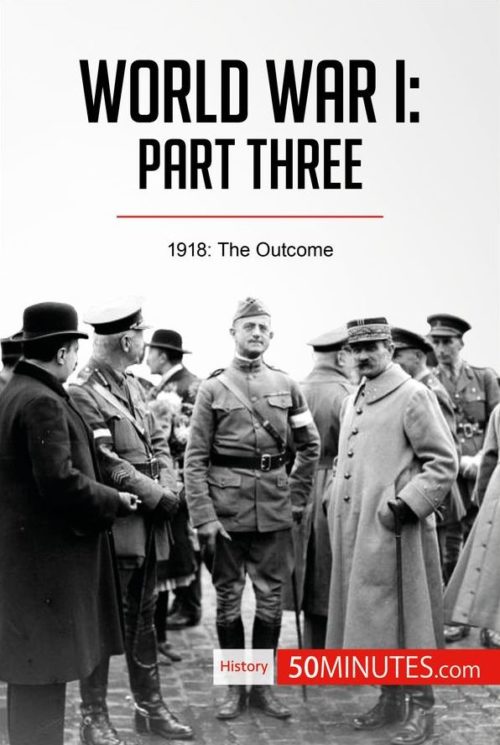The Battle of Waterloo
The Battle of Waterloo
The Battle That Changed Europe Forever
$4.99
978280627289847EBookPlurilingua PublishingThe decisive victory of the forces of the Seventh Coalition at the Battle of Waterloo in 1815 put a stop to Napoleon Bonaparte's military ambitions, marked the end of the Hundred Days and saw the French emperor exiled to the island of Saint Helena, where he died in 1821. The battle had major consequences across Europe: it marked a significant decline of French power, exhausted by the Revolution and the Napoleonic Wars, and was followed by a lengthy period of relative international peace. In just 50 minutes, you will learn about the key moments and outcome of the Battle of Waterloo and understand its major influence on subsequent military strategy.
This straightforward and informative book provides a thorough discussion of the events leading up to the Battle of Waterloo and the strategies of both sides. It also features biographies of the main commanders and leaders, including Napoleon and Arthur Wellesley, Duke of Wellington, a valuable introduction to the political and social context, and an evaluation of the battle's consequences in France and abroad, giving you everything you need to know about this decisive combat.
About the Battle of Waterloo
After a string of dazzling military victories and a period of territorial expansion, Napoleon I, Emperor of the French, was defeated for the first time in 1814 and exiled to the island of Elba. His return to Paris a year later marked the beginning of the Hundred Days, the last period of his reign. This came to an end following the Battle of Waterloo, where coalition forces commanded by Arthur Wellesley, Duke of Wellington, inflicted a crushing defeat on the French troops. The Battle of Waterloo was the beginning of a new chapter in military history, and resulted in a reorganization of Europe based on the principles of legitimacy and European balance.
This clear and accessible 47-page book is structured as follows:
Introduction to the Battle of Waterloo
Political and social context
The wars of the French Revolution, a prelude to the Napoleonic Wars
The French Empire, from victories to numerous setbacks
The Hundred Days
Commanders and leaders
Napoleon I, French emperor
Arthur Wellesley, commander of British, Dutch and German troops
Gebhard Leberecht von Blücher
Analysis of the battle
Preparations
The first act: the French attack
The second act: the arrival of the Prussians
The third act: the attack from the coalition
The Battle of Waterloo: outcome and controversies
Impact of the Battle of Waterloo
International consequences
Consequences in France
The domination of Great Britain
Military consequences
Summary
The decisive victory of the forces of the Seventh Coalition at the Battle of Waterloo in 1815 put a stop to Napoleon Bonaparte's military ambitions, marked the end of the Hundred Days and saw the French emperor exiled to the island of Saint Helena, where he died in 1821. The battle had major consequences across Europe: it marked a significant decline of French power, exhausted by the Revolution and the Napoleonic Wars, and was followed by a lengthy period of relative international peace. In just 50 minutes, you will learn about the key moments and outcome of the Battle of Waterloo and understand its major influence on subsequent military strategy.
This straightforward and informative book provides a thorough discussion of the events leading up to the Battle of Waterloo and the strategies of both sides. It also features biographies of the main commanders and leaders, including Napoleon and Arthur Wellesley, Duke of Wellington, a valuable introduction to the political and social context, and an evaluation of the battle's consequences in France and abroad, giving you everything you need to know about this decisive combat.
About the Battle of Waterloo
After a string of dazzling military victories and a period of territorial expansion, Napoleon I, Emperor of the French, was defeated for the first time in 1814 and exiled to the island of Elba. His return to Paris a year later marked the beginning of the Hundred Days, the last period of his reign. This came to an end following the Battle of Waterloo, where coalition forces commanded by Arthur Wellesley, Duke of Wellington, inflicted a crushing defeat on the French troops. The Battle of Waterloo was the beginning of a new chapter in military history, and resulted in a reorganization of Europe based on the principles of legitimacy and European balance.
This clear and accessible 47-page book is structured as follows:
Introduction to the Battle of Waterloo
Political and social context
The wars of the French Revolution, a prelude to the Napoleonic Wars
The French Empire, from victories to numerous setbacks
The Hundred Days
Commanders and leaders
Napoleon I, French emperor
Arthur Wellesley, commander of British, Dutch and German troops
Gebhard Leberecht von Blücher
Analysis of the battle
Preparations
The first act: the French attack
The second act: the arrival of the Prussians
The third act: the attack from the coalition
The Battle of Waterloo: outcome and controversies
Impact of the Battle of Waterloo
International consequences
Consequences in France
The domination of Great Britain
Military consequences
Summary
application/pdf1 19th century, colonization, European history, expansion, France, Great Britain, military strategy, Napoleon Bonaparte, Napoleonic Wars
DOWNLOAD THIS BOOK
The decisive victory of the forces of the Seventh Coalition at the Battle of Waterloo in 1815 put a stop to Napoleon Bonaparte's military ambitions, marked the end of the Hundred Days and saw the French emperor exiled to the island of Saint Helena, where he died in 1821. The battle had major consequences across Europe: it marked a significant decline of French...
Read more
The decisive victory of the forces of the Seventh Coalition at the Battle of Waterloo in 1815 put a stop to Napoleon Bonaparte‘s military ambitions, marked the end of the Hundred Days and saw the French emperor exiled to the island of Saint Helena, where he died in 1821. The battle had major consequences across Europe: it marked a significant decline of French power, exhausted by the Revolution and the Napoleonic Wars, and was followed by a lengthy period of relative international peace. In just 50 minutes, you will learn about the key moments and outcome of the Battle of Waterloo and understand its major influence on subsequent military strategy.
This straightforward and informative book provides a thorough discussion of the events leading up to the Battle of Waterloo and the strategies of both sides. It also features biographies of the main commanders and leaders, including Napoleon and Arthur Wellesley, Duke of Wellington, a valuable introduction to the political and social context, and an evaluation of the battle’s consequences in France and abroad, giving you everything you need to know about this decisive combat.
About the Battle of Waterloo
After a string of dazzling military victories and a period of territorial expansion, Napoleon I, Emperor of the French, was defeated for the first time in 1814 and exiled to the island of Elba. His return to Paris a year later marked the beginning of the Hundred Days, the last period of his reign. This came to an end following the Battle of Waterloo, where coalition forces commanded by Arthur Wellesley, Duke of Wellington, inflicted a crushing defeat on the French troops. The Battle of Waterloo was the beginning of a new chapter in military history, and resulted in a reorganization of Europe based on the principles of legitimacy and European balance.
This clear and accessible 47-page book is structured as follows:
- Introduction to the Battle of Waterloo
- Political and social context
- The wars of the French Revolution, a prelude to the Napoleonic Wars
- The French Empire, from victories to numerous setbacks
- The Hundred Days
- Commanders and leaders
- Napoleon I, French emperor
- Arthur Wellesley, commander of British, Dutch and German troops
- Gebhard Leberecht von Blücher
- Analysis of the battle
- Preparations
- The first act: the French attack
- The second act: the arrival of the Prussians
- The third act: the attack from the coalition
- The Battle of Waterloo: outcome and controversies
- Impact of the Battle of Waterloo
- International consequences
- Consequences in France
- The domination of Great Britain
- Military consequences
- Summary






